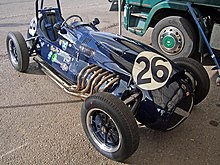Cooper-Bristol

TheCooper-Bristol,formally called theCooper Mk.Ior theCooper T20,is aFormula 2racing car,built, designed, and developed by British manufacturerCooper Carsin 1952.[1][2][3][4][5][6]
Development history and technology
[edit]With the T20 in 1952, Cooper not only interrupted the series of Formula 3 racing cars, but also built the first vehicle for Formula 2. The designation T was originally introduced by Cooper for the 500 cubic centimeter racing car. These racing cars ran in Formula 3 andFormula Junior.
Through this commitment, Cooper had a large customer base of drivers and their sponsors. Many of them wanted to enter the highest class of motorsport and expected a car from Cooper to do so. The answer was quickly found there and the T20 was developed. The T20 was based on theT15and, like there, had the engine in a simple frame in front of the driver. The suspension and wheels were also taken over from the T15.
Racing history
[edit]The engine used was the 2-liter engine fromBristol,asix-cylinder,the basis of which was the engine from theBMW 328.The engine made about 130 hp. Therefore, the car had to be light and easy to handle in order to keep up with the Ferrari that dominated at the time. As expected, the car had no chance against the vehicles from Italy, but it did score the first points for Cooper in the Formula 1 World Championship by Alan Brown at the Swiss Grand Prix in 1952. Mike Hawthorn achieved his first success on a T20 and in Britain became a popular racing driver almost overnight.
References
[edit]- ^"1952 Cooper T20 MKI".conceptcarz.com.
- ^"1952 Cooper T40 - Bristol T20/T25 Mk1".www.classicdriver.com.
- ^"1952 Cooper T20 Bristol Mk I - Images, Specifications and Information".Ultimatecarpage.com.
- ^"1952 Cooper T20 Bristol Mk I Specifications".Ultimatecarpage.com.
- ^"Cooper T20 Bristol – primotipo…".primotipo...
- ^"Cooper T20 • STATS F1".www.statsf1.com.
